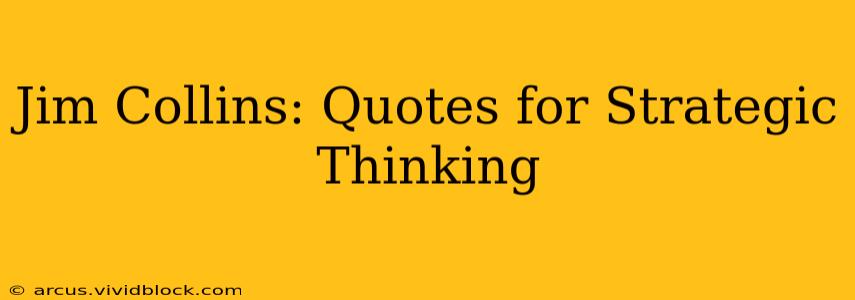Jim Collins, a renowned author and researcher in business management, has profoundly impacted how we approach strategic thinking and achieving lasting success. His insightful work, including "Good to Great" and "Built to Last," has provided countless leaders with frameworks for building enduring organizations. This article delves into some of Collins' most impactful quotes, exploring their meaning and practical application in today's dynamic business environment. We'll also address common questions surrounding his philosophies and their relevance to modern strategic thinking.
Understanding Jim Collins' Philosophy
Before diving into specific quotes, it's crucial to understand the core tenets of Collins' work. He emphasizes a data-driven, rigorous approach to understanding what separates good companies from truly great ones. He doesn't focus on charisma or luck, but rather on disciplined people, rigorous processes, and a deep understanding of a company's core values and capabilities. His work stresses the importance of long-term vision, coupled with a willingness to adapt and change in response to evolving circumstances.
Key Quotes and Their Implications
Here are some of Jim Collins' most powerful quotes, followed by an analysis of their strategic implications:
"Good is the enemy of great." This seemingly simple statement highlights a critical point: settling for "good" prevents the pursuit of excellence. It's a call to constantly strive for improvement, to push beyond complacency, and to relentlessly pursue greatness. Strategically, this means constantly evaluating your performance, identifying areas for improvement, and setting ambitious yet achievable goals.
"First who...then what." This quote emphasizes the importance of getting the right people on the board before defining the strategy. The right people, possessing the right values and capabilities, are essential for executing a successful strategy. Finding and retaining individuals who are not just skilled but also aligned with your vision is a cornerstone of strategic success.
"Clock building, not time telling." This metaphor underscores the importance of building enduring systems and processes rather than simply focusing on short-term results. It's about creating a sustainable organizational structure capable of navigating change and uncertainty. Strategically, it necessitates investing in long-term infrastructure, training, and talent development.
"Preserve the core/stimulate progress." This speaks to the balance between maintaining a company's core values and identity while simultaneously embracing innovation and change. It's about keeping what works well while adapting to new challenges and opportunities. The key is finding the right equilibrium between preserving the essential elements of your business model and fostering adaptation for long-term sustainability.
Frequently Asked Questions (PAAs)
Here we address some common questions people ask about Jim Collins' work and its application:
How can I apply Jim Collins' principles in my own career?
Collins' principles aren't limited to large corporations. They apply to individual careers as well. Focus on identifying your core values and strengths, set ambitious goals, and constantly seek improvement. Surround yourself with people who support your growth and challenge you to be better. Focus on building your skills and knowledge, rather than just chasing immediate rewards.
Are Jim Collins' ideas still relevant in today's fast-paced business environment?
Absolutely. While the business landscape has changed dramatically, the fundamental principles of building a strong team, cultivating a clear vision, and relentlessly pursuing excellence remain timeless. Collins' emphasis on long-term thinking is particularly relevant in an era characterized by rapid technological change and global interconnectedness.
What are some common mistakes companies make when trying to implement Collins' ideas?
One common mistake is a superficial understanding of his work. It requires a deep commitment to self-assessment, honest evaluation, and a willingness to make tough choices. Another is focusing solely on the "what" without sufficient attention to the "who." Building the right team is as critical as developing the right strategy. Finally, a failure to truly embrace long-term thinking often undermines attempts to implement his principles effectively.
Can small businesses benefit from Collins' philosophies?
Undoubtedly. Collins' principles are scalable and adaptable. Even small businesses can benefit from focusing on core values, building a high-quality team, and striving for excellence. The key is to tailor his ideas to the specific context of the business.
Conclusion
Jim Collins' work provides invaluable insights into building enduring, successful organizations. By understanding and applying his principles, businesses of all sizes can improve their strategic thinking, build stronger teams, and achieve lasting success. Remember that consistent effort, a long-term perspective, and a commitment to excellence are key to reaping the rewards of Collins' profound insights.

